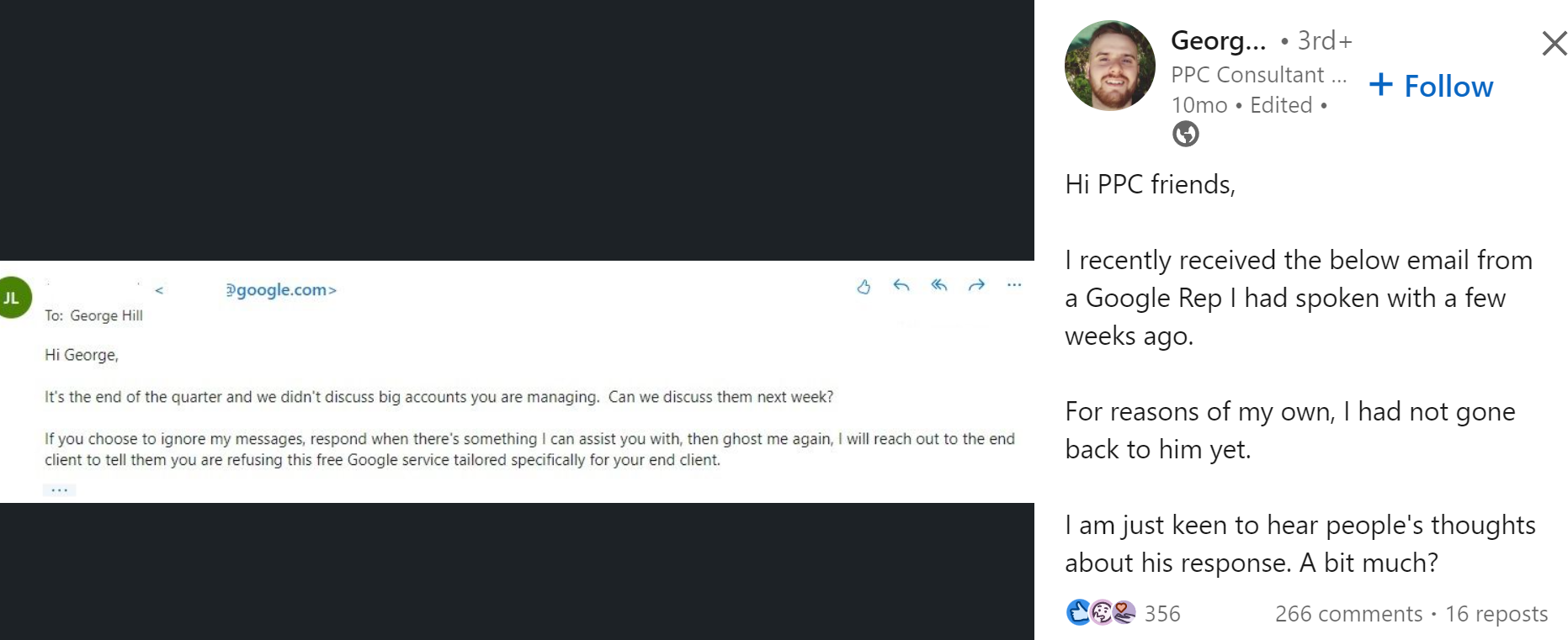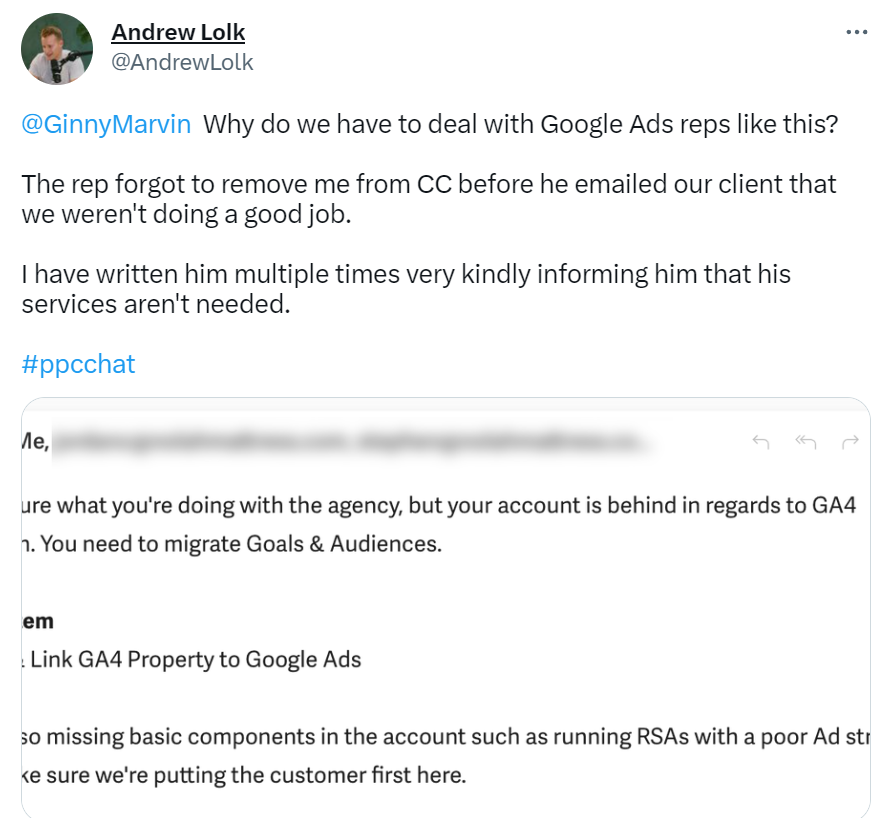If you look after a Google Ads account, chances are you’ll have been on the receiving end of dozens (if not hundreds) of unsolicited calls and emails from Google reps (or Google Account Strategists, as they call themselves) pointing out that your Google Ads campaign is under-performing and urging you schedule a call with them to discuss recommendations for fixing or improving the campaign.
Once upon a time, receiving a call or email like this ‘from Google’ might have seemed like a big deal (wow, they’ve got a google.com address!’ This must be important, etc). Nowadays, it's a different story. For a start, many of these reps aren't actually employed directly by Google. They are often employed by third party organisations to push new products and ultimately get you to spend more, either in the short or long term.
Whilst spending more on Google Ads isn’t bad per se, it’s usually the advice they give which annoys me and the PPC team here at Adido. It’s often misguided, out of context and ultimately serves their end - not our clients.
Are all Google reps bad?
Of course not - once in a while you come across a rep who really knows their stuff and genuinely wants to get the best out of your ad campaigns. Sadly though, this is the exception to the rule. At the end of the day, Google reps are salespeople, not account managers. Their job is to make themselves - and Google - as much money as possible, which means they don’t necessarily have your account’s best interest at heart.
Over the last decade or so, Google sales reps have shifted their focus from offering helpful support, such as providing useful insights and resolving technical issues, to prioritising sales. At the same time, Google Ads has transformed from a platform where advertisers had significant control over keywords and bids for specific search terms, to a heavily AI-driven system that emphasises 'optimisations'. This shift has made it challenging for advertisers to maintain the same level of control they once had, and has led to increased reliance on AI and Google reps for campaign management.
The other problem seems to be that many of these reps are here for a good time, not a long time, meaning it’s almost impossible for them to build any sort of meaningful client relationship or get to know the nuances and intricacies of an account, the same way an independent account manager or agency would. Once in a blue moon, you might find a great rep who knows their stuff, but chances are they won’t stick around for long, then you’re back to the script-fed hard-sell churn of yet another newbie ‘strategist’.
Dubious tactics
If you’re an independent PPC account manager or agency who chooses to ignore Google sales reps' numerous calls or emails, some may resort to contacting your clients directly to persuade them to allow changes to the client account, offering free of charge recommendations where ‘optimisation improvements’ could be made. This tactic aims to sow seeds of doubt in the client’s mind, leaving them questioning your capabilities or commitment to your account. And just like that, the trust is gone.

Can they get away with it?
There are some things to make clear here:
- Agencies are not under any obligation to speak with Google reps.
- At no point should a Google Ads rep call an agency’s client, or threaten an agency with this action.
- Google has no say over how agencies or account managers run clients’ campaigns.
Google itself has remained somewhat tight-lipped over the more unscrupulous activities of some of its reps (they are, after all, a business reliant on ad revenue), but have been forced to stick their head above the parapet a few times, such as in the example below.


This isn’t the first time Google’s Ads Liaison Ginny Marvin has had to publicly apologise for the behaviour of reps. As a general rule, however, Google appears to be content to turn a blind eye to questionable sales techniques and the countless examples where recommendations have had dire consequences for ad campaigns. Not a great look for a platform whose self-proclaimed purpose is to put helpful, reliable content in front of its users.
What are their go-to recommendations?
These reps are nothing if not predictable in terms of their recommendations, and usually boil down to the three following instructions:
Turn on broad match keywords
This refers to a setting where an advertiser allows their ad to show up for search queries that are loosely related to the targeted keywords, leading to a wider reach and subsequently more clicks.
Problem here is that this wider reach will also lead to a higher number of irrelevant clicks and impressions, which can increase ad spend without resulting in conversions or sales. The only winner in this quantity over quality approach? Google of course!
"Even when you get a dedicated account strategist (higher level, when you’re spending 30k/month or more) they still push for broad match keywords, “put every keyword in the same pot” and move your account to maximise conversion value. Which is horrific advice for most accounts. Just in the past 3 months I’ve seen 3 accounts tank because of that."
Switch to CPA
Cost per acquisition (CPA) is a metric used in online advertising that measures the cost of acquiring a customer, such as a sale or a lead. While CPA has some perks, it’s not always great for ad campaigns, resulting in a sacrifice of other important metrics such as CTR and impression volume to achieve a low cost per acquisition. Additionally, it provides a window for Google reps to encourage ad account owners to raise the CPA target, resulting in a higher spend for potentially lower reward.
"I actually answered and listened to an ad rep last week…sure enough he wanted me to change my branded campaign to Target CPA model….this PERSONAL EXPERIMENT ended up costing me about $5,500 in sales and there was no follow up and no regard to the effects of changing a working campaign."
Enable auto apply recommendations
Auto-apply recommendations are AI-led suggestions made by Google that can be automatically implemented in an account without the need for manual review or approval. Occasionally, the recommendations are helpful. More often than not though, they are disastrous, leading to campaigns going over budget with little to show in terms of ROI. Our view is you should avoid the auto apply suggestions like the plague or review the recommendations VERY carefully before enabling them.
"They are sales reps with almost no understanding of PPC strategy beyond the top-down slide decks they are fed. I made the mistake of switching over to their automated strategy on a high performing manual campaign I set up, and it costed us thousands in excess spend and fewer sales over the few weeks I let it “learn”. Then it took even longer to get it back to where it was before"
What should I do if I have been contacted by a Google rep?
If you are working with an account manager or agency: there’s no harm in listening to what the rep has to say, but you should exercise caution and apply a healthy dollop of cynicism before allowing them to make any changes to your Google Ads account. Instead, consult with your agency to understand the impact of those changes on your objectives. If you wish to test a recommendation, your agency can create an ‘experiment’ in Google Ads to compare outcomes without undoing previous optimisations. Your agency or PPC account manager should be invested in the success of your ad campaigns and long-term business goals and will be able to recognise whether a recommended optimisation is in your best interest.
If you are managing your own account: Be aware that Google prioritises their financial gains over yours and don’t be pressured into believing that what they’re telling you is gospel. Listen to what they say and ask them to email you their suggestions. If you feel unsure or overwhelmed by the process, seeking guidance from an independent agency for a consultation or audit of your Google Ads account can be extremely beneficial. This provides the opportunity to gain unbiased insights from a third party, which can help save time, money, and effort in the long run.
Summary
The purpose of this article is not to demonise an entire group of people for their career choice. After all, we’re all in it for the money to some extent - it’s what pays the bills and puts food on the table. Some of you may have had some really positive experiences with reps over the years and seen some great results following their recommendations.
The point I want to get across is that you should only be prepared to put your Ads account in the hands of someone who is as passionate about its success as you are…and I’m afraid to say that more often than not, that isn’t Google reps.






